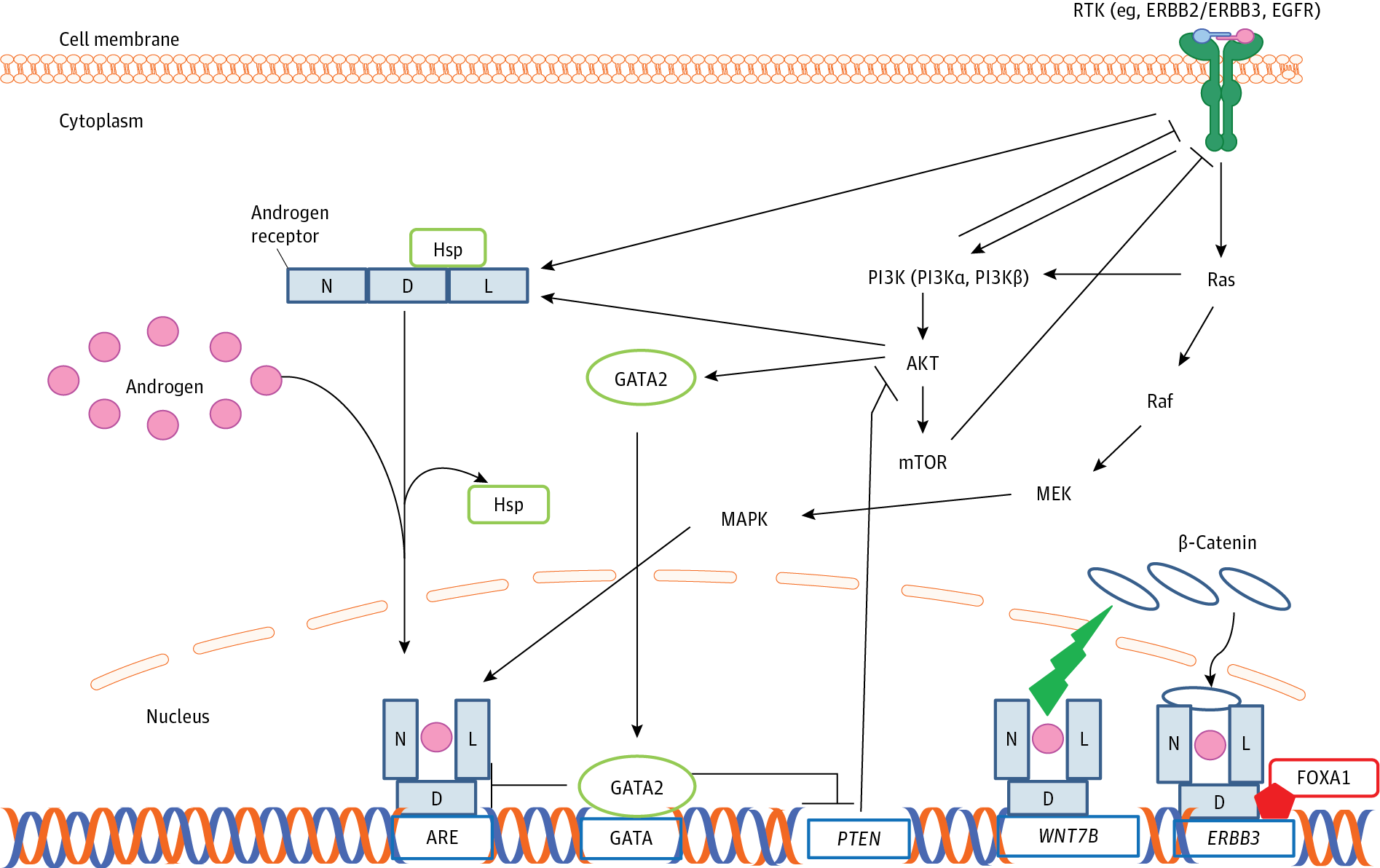当前位置:
X-MOL 学术
›
JAMA Oncol.
›
论文详情
Our official English website, www.x-mol.net, welcomes your feedback! (Note: you will need to create a separate account there.)
Androgen Receptor Function and Androgen Receptor-Targeted Therapies in Breast Cancer: A Review.
JAMA Oncology ( IF 28.4 ) Pub Date : 2017-09-01 , DOI: 10.1001/jamaoncol.2016.4975 Miho Kono 1, 2 , Takeo Fujii 1, 2 , Bora Lim 1, 2 , Meghan Sri Karuturi 1 , Debasish Tripathy 1, 2 , Naoto T Ueno 1, 2
JAMA Oncology ( IF 28.4 ) Pub Date : 2017-09-01 , DOI: 10.1001/jamaoncol.2016.4975 Miho Kono 1, 2 , Takeo Fujii 1, 2 , Bora Lim 1, 2 , Meghan Sri Karuturi 1 , Debasish Tripathy 1, 2 , Naoto T Ueno 1, 2
Affiliation

|
Importance
The androgen receptor (AR) pathway is emerging as a potential therapeutic target in breast cancer. To date, AR-targeted drugs have been approved only for treatment of prostate cancer; however, AR-targeted treatment for breast cancer is an area of active investigation. Through review of preclinical studies, retrospective clinical studies, and clinical trials, we examined the biology of AR and AR-related pathways, the potential for AR-targeted therapies in breast cancer, and potential biomarkers for AR-targeted treatments.
Observations
The rate of AR positivity in breast cancer is about 60% to 80%. Biologically, the AR pathway has cross-talk with several other key signaling pathways, including the PI3K/Akt/mTOR and MAPK pathways, and with other receptors, including estrogen receptor and human epidermal growth factor receptor-2. The value of AR positivity as a prognostic marker has not yet been defined. Androgen receptor-targeted therapies, including AR agonists, AR antagonists, and PI3K inhibitors, have shown promising results in clinical trials in patients with breast cancer, and combinations of AR-targeted therapies with other agents have been investigated for overcoming resistance to AR-targeted therapies. Biomarkers to stratify patients according to the likelihood of response to AR-targeted drugs are yet to be established. Potential biomarkers of response to AR inhibitors include AR phosphorylation and AR gene expression.
Conclusions and Relevance
Androgen receptor-targeted treatments for breast cancer are in development and have shown promising preliminary results. In-depth understanding of AR and AR-related signaling pathways would improve the treatment strategies for AR-positive breast cancer. Further preclinical and clinical studies of AR-targeted drugs alone and in combination with other drugs are justified and warranted to clarify the biology of AR and inform the development of AR-targeted therapies to improve survival outcome in patients with breast cancer.
中文翻译:

雄激素受体功能和雄激素受体靶向治疗乳腺癌:综述。
重要性 雄激素受体 (AR) 通路正在成为乳腺癌的潜在治疗靶点。迄今为止,AR靶向药物仅被批准用于治疗前列腺癌;然而,针对乳腺癌的 AR 靶向治疗是一个积极研究的领域。通过回顾临床前研究、回顾性临床研究和临床试验,我们检查了 AR 和 AR 相关途径的生物学、AR 靶向治疗在乳腺癌中的潜力以及 AR 靶向治疗的潜在生物标志物。观察 乳腺癌中 AR 阳性率约为 60% 至 80%。在生物学上,AR 通路与其他几个关键信号通路(包括 PI3K/Akt/mTOR 和 MAPK 通路)以及其他受体(包括雌激素受体和人类表皮生长因子受体-2)有交叉对话。AR 阳性作为预后标志物的价值尚未确定。雄激素受体靶向治疗,包括 AR 激动剂、AR 拮抗剂和 PI3K 抑制剂,在乳腺癌患者的临床试验中显示出可喜的结果,并且已经研究了 AR 靶向治疗与其他药物的组合以克服对 AR 靶向治疗的耐药性疗法。根据对 AR 靶向药物的反应可能性对患者进行分层的生物标志物尚未建立。对 AR 抑制剂反应的潜在生物标志物包括 AR 磷酸化和 AR 基因表达。结论和相关性 针对乳腺癌的雄激素受体靶向治疗正在开发中,并已显示出有希望的初步结果。深入了解 AR 和 AR 相关信号通路将改善 AR 阳性乳腺癌的治疗策略。单独对 AR 靶向药物以及与其他药物联合进行进一步的临床前和临床研究是合理和有必要的,以阐明 AR 的生物学,并为开发 AR 靶向疗法以改善乳腺癌患者的生存结果提供信息。
更新日期:2017-10-06
中文翻译:

雄激素受体功能和雄激素受体靶向治疗乳腺癌:综述。
重要性 雄激素受体 (AR) 通路正在成为乳腺癌的潜在治疗靶点。迄今为止,AR靶向药物仅被批准用于治疗前列腺癌;然而,针对乳腺癌的 AR 靶向治疗是一个积极研究的领域。通过回顾临床前研究、回顾性临床研究和临床试验,我们检查了 AR 和 AR 相关途径的生物学、AR 靶向治疗在乳腺癌中的潜力以及 AR 靶向治疗的潜在生物标志物。观察 乳腺癌中 AR 阳性率约为 60% 至 80%。在生物学上,AR 通路与其他几个关键信号通路(包括 PI3K/Akt/mTOR 和 MAPK 通路)以及其他受体(包括雌激素受体和人类表皮生长因子受体-2)有交叉对话。AR 阳性作为预后标志物的价值尚未确定。雄激素受体靶向治疗,包括 AR 激动剂、AR 拮抗剂和 PI3K 抑制剂,在乳腺癌患者的临床试验中显示出可喜的结果,并且已经研究了 AR 靶向治疗与其他药物的组合以克服对 AR 靶向治疗的耐药性疗法。根据对 AR 靶向药物的反应可能性对患者进行分层的生物标志物尚未建立。对 AR 抑制剂反应的潜在生物标志物包括 AR 磷酸化和 AR 基因表达。结论和相关性 针对乳腺癌的雄激素受体靶向治疗正在开发中,并已显示出有希望的初步结果。深入了解 AR 和 AR 相关信号通路将改善 AR 阳性乳腺癌的治疗策略。单独对 AR 靶向药物以及与其他药物联合进行进一步的临床前和临床研究是合理和有必要的,以阐明 AR 的生物学,并为开发 AR 靶向疗法以改善乳腺癌患者的生存结果提供信息。



























 京公网安备 11010802027423号
京公网安备 11010802027423号